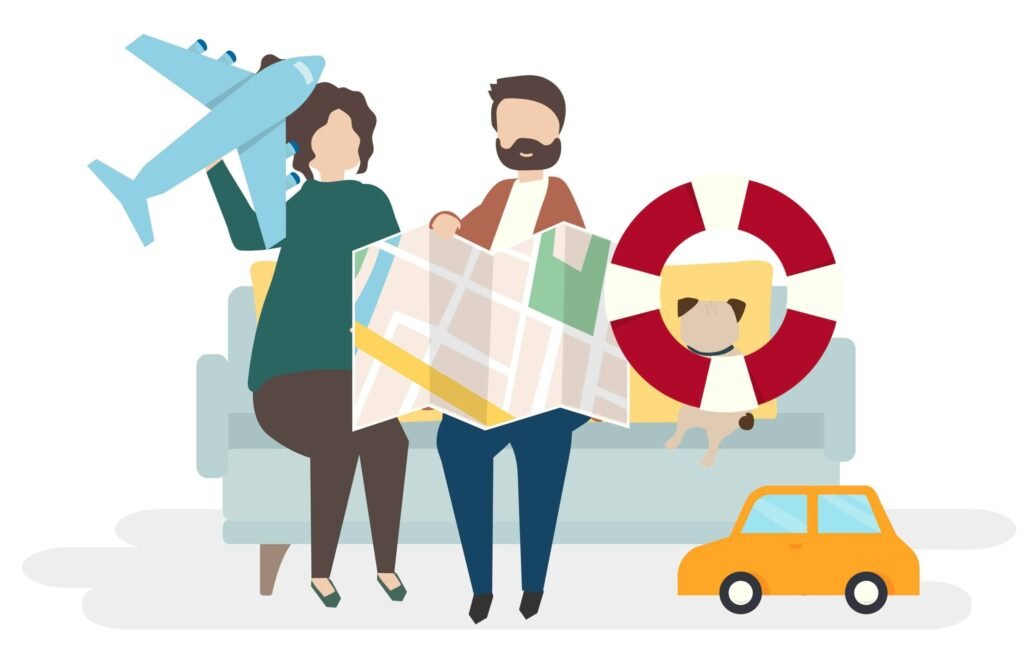The Tour Operators’ Margin Scheme is applicable when your serviced accommodation business fulfils the condition.
As discussed in our previous articles, TOMS varies from the standard VAT rule by charging VAT on the Margin made instead of on the taxable turnover.
We will now be understanding if your serviced accommodation business is eligible for the Tour Operators’ Margin Scheme.
Basic Eligible Criteria for Tour Operators’ Margin Scheme
TOMS will be applicable only if the following conditions are satisfied:

There is a supply of “Travel Services”
Accommodation is a travel service if it is held out for use by tourists, travellers or visitors. These are in direct competition with hotels. We have discussed how serviced accommodation is different from the hotel above.
Some of these services are:
- Accommodation
- Passenger transport
- Hire or means of transport
- Trips or excursions
- Services of tour guides
- Use of special lounges at airports, etc.
The supplier is acting in “own name”
Under TOMS, acting in one’s name requires a contract for lease with the landlord, allowing subletting or conducting the service accommodation business in the individual’s name if they own the property. It’s crucial not to act as an agent of the landlord, and the service provider must operate independently.
TOMS doesn’t apply to managing agents who assist landlords without buying and selling accommodations in their name. Agents are liable for VAT on their commission, not on the rental income. Managing agents not involved in buying or selling have no specific reason to apply TOMS.
The services are acquired from a third party and are supplied without “Material Alteration” or “further processing
TOMS applies only when services involve buying and reselling property without substantial alterations. Serviced apartments must be resold in a nearly identical state to their original condition. Material alterations, such as significant furnishing or major changes, exclude the transaction from TOMS.
The services are supplied “for the benefit of a traveller”
A traveller is an entity, including a business or local authority, who receives a Margin Scheme supply other than for the purpose of resupply.
Understanding the Operational Landscape: Principal or Agent in Serviced Accommodation
If the Service Accommodation operator doesn’t own the property, the first thing to figure out for VAT treatment is whether the operator is the Principal or Agent. This matters because the VAT rules are different.
Being the Principal means, the business is buying and selling serviced accommodation in its own name. If it’s more like helping out (acting as an agent), it’s doing transactions for someone else. Figuring this out involves reviewing contracts, invoices, and other practical stuff. It can be a bit tricky.
The key is to Ask: Are you the one directly buying and selling the serviced accommodation, or are you arranging for someone else, usually a landlord, to make a deal with guests or other businesses? That’s the main point to consider.
Agent vs Principal- Acting as Principal
Consider the Following Example:
If a guest rents a property for £130, and the Serviced Accommodation operator acts as a principal, the operator first receives the £130 and then pays the landlord £100.
The contractual arrangement involves a contract between the landlord and the Serviced Accommodation Operator, with the landlord selling the accommodation to the operator for £100.
Simultaneously, the operator has a separate contract with the guest for the accommodation at £130. In this scenario, the Serviced Accommodation operator is functioning as a principal.
Agent vs Principal- Acting as Agent

Practically, the position will be similar to what we discussed above
The guest will be paying £130 to a Serviced Accommodation Managing Agent, who will then be transferring £100 to the landlord.
The difference here will be with the contractual arrangements.
Here, the contract will be with the Landlord and the guest for £130. The guest, through the managing agent, will be paying the sum to the landlord.
The landlord is entitled to receive this £130 in full from the guest. However, the landlord has a separate contract with the Serviced Accommodation Managing Agent for intermediary services from the managing agent for arranging the guest to the landlord.
Here, the Serviced Accommodation Managing Agent is not contractually responsible for the guest.
TOMS Spotlight: Material Alteration as a Pivotal Element
TOMS is applicable only when services are purchased and resold without undergoing ‘Material Alteration.’
A crucial factor for serviced apartments is the need to resell services without making substantial alterations to the original condition when the Serviced Accommodation was initially acquired.
The term ‘material alteration’ lacks a precise legal or regulatory definition.
HMRC commonly identifies certain factors as indicative of material alteration, including:
- Apartment furnished by the Serviced Accommodation Operator.
- Serviced Accommodation operator pays for utilities and other bills.
- Serviced Accommodation operator has a long lease of more than 12 months with the landlords.
- Serviced Accommodation operator carries out repairs and maintenance of any type.
- Serviced Accommodation operator has staff or other services at the property .
To sum up!
Accommodation qualifies as a travel service when it is presented for use by tourists, travellers, or visitors, often competing directly with hotels.
The Tour Operators’ Margin Scheme (TOMS) comes into play only when the supplier operates as a principal or an ‘undisclosed agent’ in the service sale; it does not apply when acting as a disclosed agent, with the contract playing a crucial role in this distinction.
Services must directly benefit the traveller when they are the customer acquiring the services. Crucially, the property should not undergo material alterations.
We are dedicated to solve your queries.
Contact us for assistance at any stage of your journey.